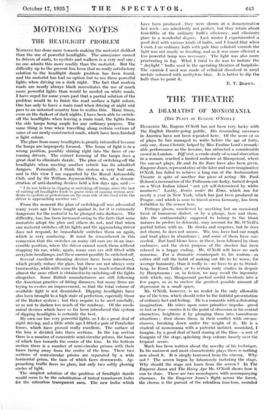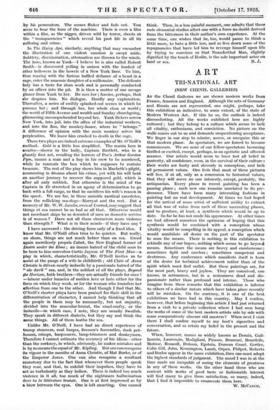THE THEATRE
A DRAMATIST OF MONOMANIA
(THE PLAYS OF EL GENE O'NEILL.) HITHERTO Mr. Eugene O'Neill has not been very lucky with the English theatre-going public. His resounding successes in America have not been repeated here. Of the score or so of plays he has managed to write before the age of forty, only one, Anna Christie, helped by Miss Pauline Lord's remark- able performance as the heroine, has attracted a considerable
crowd in London. DT-rent, a crude study of sexual starvation in a woman, reached a limited audience at Hampstead, where
the one-act plays, lie and In the Zone have also been given.
Emperor Jones, representative of the later and more imaginative O'Neill, has failed to achieve a long run at the Ambassadors Theatre in spite of another fine piece of acting—Mr. Paul Robson's incarnation of the Pullmann-car darky, turned despot on a West Indian island " not yet self-determined by white mariners." Lastly, Desire under the Elms, which ran for nearly a year in New York, which has just been produced in Prague, and which is soon to travel across Germany, has been forbidden by the censor here.
Perhaps gloom, unrelieved by anything but an occasional twist of humorous dialect, or by a plunge, here and there, into the sentimentality supposed to belong to the blunt natures he prefers to delineate, may account for Mr. O'Neill's partial failure with us. He shocks and surprises, but he does not charm, he does not amuse. We, too, have had our rough and loud plays in abundance ; and some of them have suc- ceeded. But hard blows have, in these, been followed by close embraces, and the stem purpose of the shocker has been relaxed in a happy ending. Mr. O'Neill will have no such nonsense. For a dramatic counterpart to his realism—as
critics still call the habit of making out life to be worse, for average humanity, than it really is—we have to go to Strind- berg, to Ernst Toiler, or to certain early studies in despair by Hauptmann ; or, in fiction, we may recall the ingenuity , with which, say, Maupassant packed sordid incidents into a few pages, so as to enclose the greatest possible amount of depression in a small space.
Mr. O'Neill, however, is no realist in the only allowable use of the term, which should refer to the faithful presentation
of ordinary fact and feeling. He is a romantic with a distorting imagination. He seizes upon some primitive impulse—greed or lust or fear—carries it to the point of obsession in his central characters, heightens it by plunging them into tumultuous. •
situations ; then shows them, in their conflict with circum- stances, breaking down under the weight of it. He is a student of monomania with a pictorial instinct, nourished, I imagine, by a good deal of hard staring at the films—a sort of Gauguin of the stage, splashing deep colours loosely over the tropical scene.
Much has been written about the novelty of his technique. In his maturest and most characteristic plays there is nothing new about it. It is simply borrowed from the cinema. Why not Y The screen began by laboriously imitating the stage. Why should the stage not learn from the screen ? In The Emperor Jones and The Hairy Ape Mr. O'Neill shovis how it can be done. These are two monologues, with accompanying choruses. In the Emperor Jones's flight across the forest, the chorus is the pursuit of the relentless tom-tom, sounded
by his persecutors. The scenes flicker and fade out. You seem to hear the hum of the machine. There is even a film within a film, as the nigger, driven wild by terror, shoots at the " transparencies " which reveal his past life in all its suffering and crime.
In The Hairy Ape, similarly, anything that may encumber the illustration of one violent emotion is swept aside. Subtlety, discrimination, attenuation are thrown to the winds. The hero, known as Yank—I believe he is also called Robert Smith—is discovered yelling in unison with the loudest of other bellowers in the bowels of a New York liner. To him, thus roaring with the furious baffled defiance of a beast in a cage, enter the anaemic daughter of a millionaire. The delicate lady has a taste for alum work and is personally conducted by an officer into the pit. It is then a matter of one savage glance from Yank to her. He sees her ; fancies, perhaps, that she despises him. No dialogue. Hardly any explanation. Thereafter, a series of swiftly splashed-out scenes in which he pursues her ; and through her, her whole class or world ; the world of Fifth Avenue and wealth and Sunday churchgoing, glimmering uncomprehended beyond her. Yank flickers across New York, into jail, into the office of the industrial workers, and into the Zoo, the monkey-house, where he " belongs." A difference of opinion with the main monkey solves his perplexities. We leave him crushed to death in the cage.
These two plays are indeed extreme examples of Mr. O'Neill's method. Gold is a little less simplified. The mania here is avarice—shown in the bully, Captain Bartlett, who in a ghastly first act, recalling the horrors of Poe's Arthur Gordon Pym, causes a man and a boy in his crew to be murdered, while he conceals the box which he supposes to contain treasure. The rest of the play shows him in Maebeth's plight, murmuring in dreams about his crime, yet with his will bent on another journey to recover the supposed gold, which is after all only rubbish. Not otherwise is the mind of the Captain in Ile stretched in an agony of determination to go back with a full cargo, so that he sacrifices his wife's reason in the quest. We are far, in these amiable nautical anecdotes, from the rollicking sea-dogs--Marryat and the rest. But a memory of Mr. W. W. Jacobs, even of Conrad, may suggest that things at sea cannot be so bad as all that. Otherwise would not merchant ships be as denuded of men as domestic service is of women ? Have not all these characters more violence than strength ? What is in their minds—if they have any ?
I have answered : the driving force only of a fixed idea. I know that Mr. O'Neill often tries to be quieter. But really, on shore, things are not much better than on sea. Greed again mercilessly propels Cabot, the New England farmer of Desire under the Elms ; an insane hatred of the child soon to be born to him convulses Curtis Jayson of The First Man—a play in which, characteristically, Mr. O'Neill invites us to assist at the pangs of a wife in childbirth ; old Chris of Anna Christie is driven nearly imbecile by a passionate hatred of the " ole davil " sea, and, in the mildest of all the plays, Beyond the Horizon, both brothers—they are actually friends for once —labour under lunacies of sudden love or hate either for the farm on which they work, or for the woman who transfers her affection from one to the other. And though I find that Mr. O'Neill's shorter plays have been praised for their skill in the differentiation of character, 1 cannot help thinking that all the people in them may be summarily, but not unjustly, divided into the muscular-brutal, the cruel-crafty, or the imbecile—in which case, I note, they are usually Swedish. They speak in different dialects, but they say and think the same things. All of them loathe the sea.
Unlike Mr. O'Neill, I have had no direct experience of tramp steamers, coal barges, firemen's forecastles, dock pot- houses, crimps, harpooners, lamp-trimmers and donkey-men. Therefore I cannot estimate the accuracy of his idiom—other than the coekney, in which, obviously, he makes mistakes and is by no means the equal of Mr. Kipling. But one can recognise its vigour in the mouths of Anna Christie, of Mat Burke, or of the Emperor Jones. One can also recognise a resultant monotony due to the fact that whenever these people speak they roar, and that, to exhibit their impulses, they have to act as turbulently as they bellow. There is indeed too much violence in it all, too much of the nightmare hallucination dear to /a litterature brutale. One is at first impressed as by a blow between the eyes. One is left smarting. One cannot
think. Then, in a less painful.moment„. one admits that these rude elemental studies affect one with a force no doubt derived from the bitterness in their author's own experience. At the same time, one wishes that he, too, would pause to :think a little more, to hate a little less, and so live down some of the repug,nancies that have led him to revenge himself upon life by trying to convince us that Neanderthal Man, slightly dignified by the touch of Rodin, is the sole important actor on



















































 Previous page
Previous page